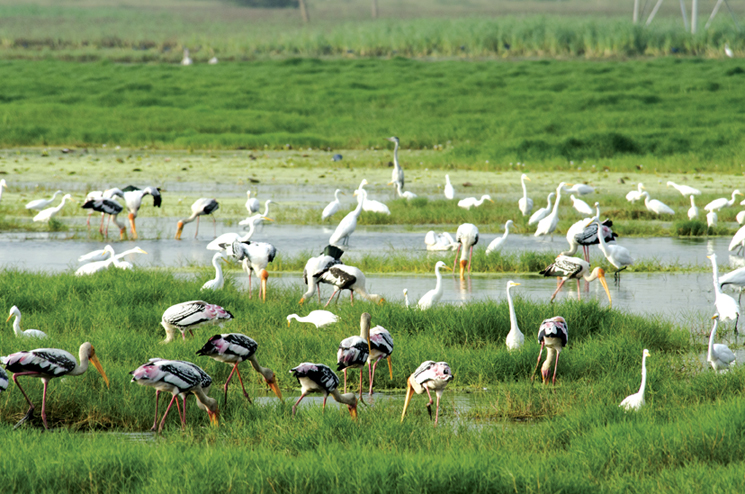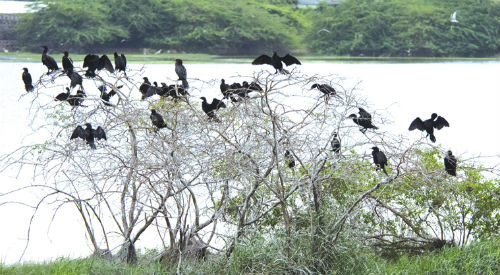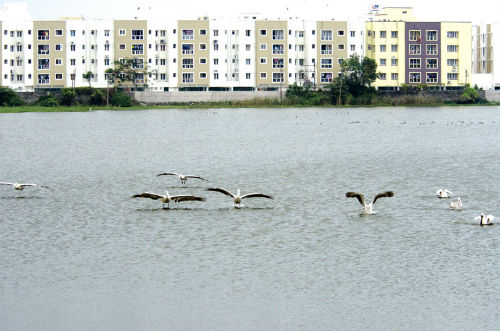Registered with the Registrar of Newspapers for India under R.N.I 53640/91
Vol. XXVII No. 18, January 1-15, 2018
Will appreciation of this be taught in syllabus…
By Our Education Correspondent
Humanities still get short shrift

Painted Stork (above), Cormorants (below left) and Pelicans (below right) arrive for the Season at Sholinganallur marshland.
Statistical indicators of the physical and quantitative aspects of the education system show Tamil Nadu in good light in comparison with other States. Sufficiency of infrastructure, however, does not by itself ensure efficacy. Syllabus content and teaching methodologies produce the final impact. The growing number of unemployable graduates, instances of their having to take up lesser positions unrelated to their qualifications, and Tamil Nadu students finding it difficult to compete in all-India eligibility tests expose the qualitative weaknesses of the State’s education system. To meet this challenge, the Government a few months ago set up a committee to work with the State Council for Educational and Research Training and come up with a new syllabus for Higher Secondary Schools.
The new syllabus, claims SCERT, is “a more holistic one that aids real life.” The syllabus for the first time has included an exclusive position paper on Information and Communication Technology (ICT) and elaborated its importance in the current scenario. ICT has been introduced at the primary level itself, so that learning is not confined to textbooks but extended at the teaching access to the internet, introducing students to technology as part of the curriculum. Subject to availability of qualified teachers for this module, it is a welcome step and it is of practical significance in “real life”, provided students are made aware that the information they will find from these sources will not always be the most accurate.
Like familiarity with the computer and the internet, a working knowledge of English has become an overarching necessity, besides knowledge of focused subjects. Knowledge of subjects without communication skills is today inadequate for employability. If the medium of instruction in secondary stage continues to be Tamil, students in professional courses will need to be taught technical contents in Tamil, but they are faced with instructions in English and find it difficult to cope. Consequently, when they graduate, the students have a poor grasp of the subject and low ability to express in English. Upon graduation, this group is left with paper degrees that cannot fetch jobs. Specialised training to high school teachers to teach Communicative English and getting the students accustomed to the medium of learning professional subjects being English, are essential to keep pace with the needs of ‘real life’. A library with language and English books should be mandatory and children must be encouraged to read books as regular habit rather than rely on the internet. Knowledge of English and of an additional Indian language is an ideal qualification to avail of a larger pool of opportunities beyond State boundaries.
SCERT says that importance has been given to vocational training in subjects such as agriculture, textile technology, nursing, arts like music and drawing, and even sewing. “We’ve designed it keeping in mind the market standards.” Whatever that may mean, the concept should be commended (though it can be asked why not mechanical, auto or electrical engineering, or even plumbing and carpentry?) as it is a practical approach. It enables, to a degree, the system to sort out students of different aptitudes and learning capabilities and sending some to vocational training after basic schooling and training, the others with higher learning capabilities to graduation and professional degrees. It avoids subjecting all, indiscriminately, to a one-size-fits-all type of educational content. It makes more effective use of available resources. It opens earning opportunities according to capacity and aptitude.

SCERT says that there has been a ten per cent increase in content, perhaps with a view to bring the State syllabus in line with requirements of competitive standards of NEERT etc. This is long overdue and must be commended. It should not, however, remain a dead letter without adequately trained teachers to handle the higher standards. The introduction of higher content must be incremental and must begin in doses from the primary stages so that students are not confronted with an abrupt rise in standard at a late stage. Many teachers stress the need for concomitant changes in the evaluation and examination patterns. According to P. Saravanamurugan, a teacher from Coimbatore, what set our old State syllabus a notch lower than CBSE is “the reduced relative prevalence of analytical and application-based questioning patterns.”

The most important correction in syllabus should have been bringing about a better balance between Sciences and Humanities. The revised State School syllabus for Social Science by the State Council of Educational and Research Training (SCERT) has been the subject of criticism by experienced educationists. Instead of trying to bring about a better balance, the syllabus for Social Science, heavy and overburdened in terms of content, is hardly changed at all from the previous syllabus. It lumps History, Geography, Environment, Economics and Civics into one general subject, making it unfocussed and tiresome for students and virtually impossible, for teachers to complete the course in time except to offer facts to be learned by rote.
Under cover of Current Issues, political overtones and caste/gender biases tend to infiltrate into the syllabus and these are of no use to students except to give them a dismal view of our social surroundings. Burdensome and irrelevant contents lead to mindless rote to secure minimum marks needed to avoid failure; they do not serve the basic purpose of developing thinking capabilities, critical faculties and well-rounded personalities.
According to experienced teachers what is lacking under Social Science is any attempt to develop in the student a holistic view of the eco-system, natural resources, landscapes, climatology and natural cycles and preservation of heritage. Ideally, History, Geography, and Environment should be taught as special subjects by teachers qualified in such subjects. Heritage, environmental and civic issues should be taught for putting them into practice and not just to pass exams. The heritage and environment of the students’ domicile must be made known to them, sowing in their minds the seeds of curiosity that would lead them spontaneously to inquire into the nature of the wider world around them.
Moral instruction as part of the syllabus in the olden days has fallen a victim to the drive for “secularism”. Vijaya Murthy, an educationist of fifty years’ standing and having taught students in Tamil Nadu and of mixed cultures in Singapore, is of the view that Humanities are given insufficient weightage in the curriculum. Lumping an odd mixture of subjects under one group as Social Studies does not add substantive value but results in its completion as a mere ritual. She adds that subjects like History, Geography and Environment should be taught separately by qualified teachers. Value Education should cover Ethics, Heritage, Civics. According to her, although there is provision for Value Education in the current syllabus, it is hardly pursued with any enthusiasm. Handling this subject also requires special training of teachers who should be able to pose open-ended issues to children so that that they are not handed information, but taught to think for themselves, discover values. She offers teacher training in Value Education free of cost.
The Stanford Humanities Center puts forward the case for Humanities in Education in the following succinct terms: “Through exploration of the humanities we learn how to think creatively and critically, to reason, and to ask questions… these skills allow us to gain new insights into everything from poetry and paintings to business models and politics.”
Will the SCERT give our children the opportunity?

